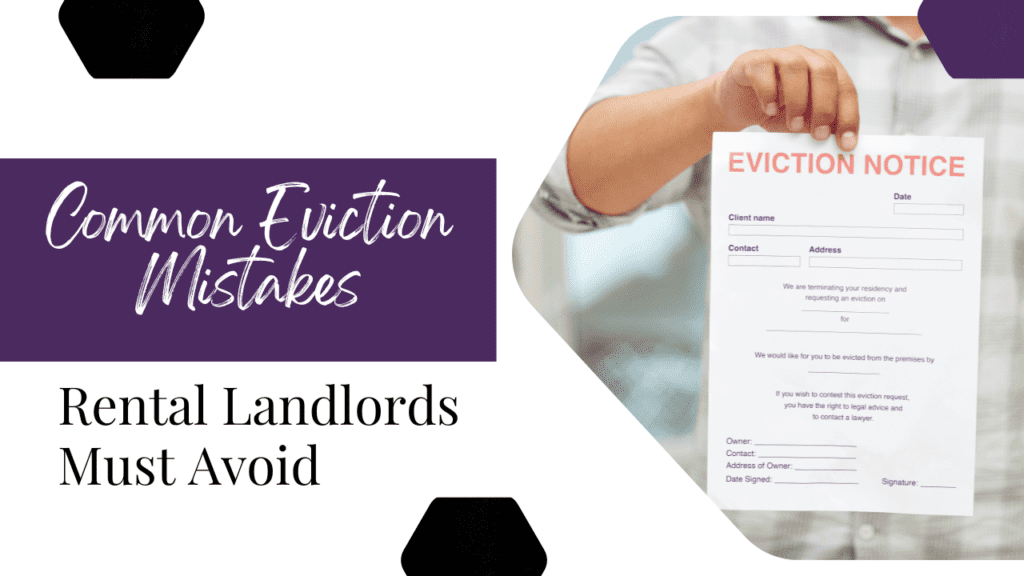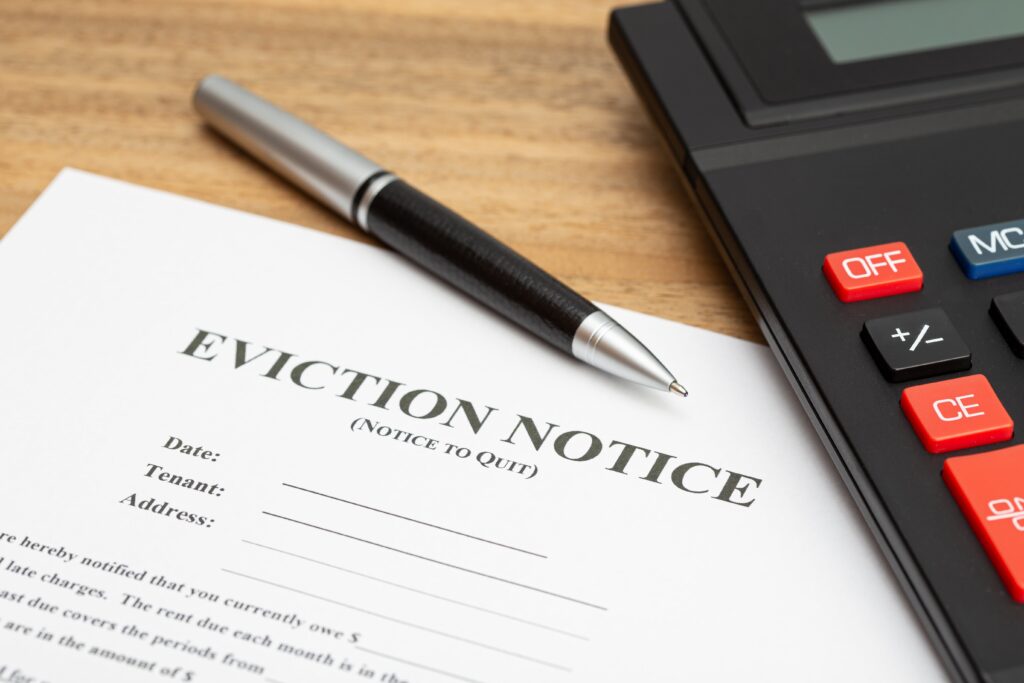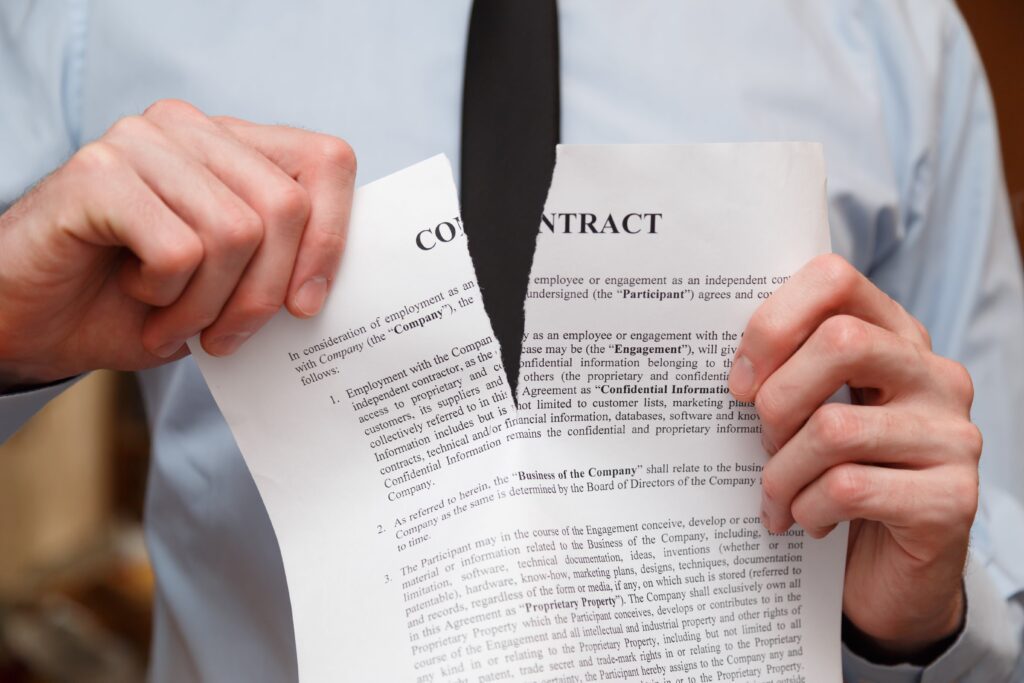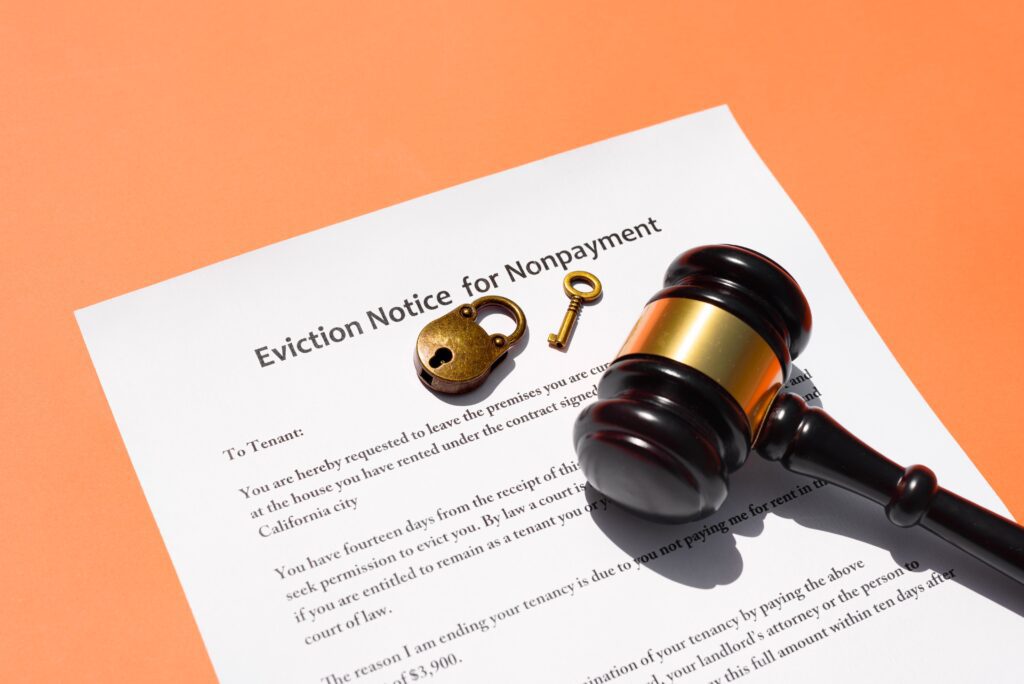
Evictions can be extremely unpleasant and when you make a mistake that delays or throws out your lawsuit, it can be frustrating and stressful.
In New Jersey, there’s a pretty standard set of processes and timelines that must be adhered to when you’re evicting a tenant. All you have to do is follow them.
But, mistakes can easily be made, especially if you’ve never done this before.
We’re going to highlight some common eviction mistakes, and we’re going to show you how to avoid them.
But, first, let’s provide this valuable piece of advice:
Don’t Do It Alone
You don’t have to flounder out there by yourself, trying to evict a tenant who hasn’t paid rent or won’t come into compliance with the pet policy in your lease agreement. Work with a professional property manager in South Jersey. Or, talk to an experienced landlord/tenant attorney.
At Realty Solutions, we are expert property managers with an entire legal staff ready to help.
When you work with us, you can avoid these eviction mistakes.
WORST MISTAKE EVER: ILLEGALLY TRYING TO EVICT A TENANT

Well, you don’t want to make this mistake.
According to New Jersey law, an eviction can only be conducted by a Special Civil Part Officer, who has a Warrant for Removal in hand. You cannot take it upon yourself to physically remove a tenant on your own. You must follow the legal process, otherwise you’re putting yourself in a lot of legal hot water.
But, it’s frustrating.
We know. When you have a tenant who has not paid rent all month and you have to wait for the courts to tell you when and how to act, it’s hard to keep your cool.
Your rental property is a business. You have to remain professional and you have to follow the law.
Here are some of the drastic – and illegal – actions we have heard of landlords taking in order to get a tenant out of their property.
| Changing the Locks | Please don’t do this. You can’t lock your tenants out of the property when they have not been formally and lawfully evicted from that property. It’s still their home, until the courts say otherwise. |
| Turning off the Utilities | You cannot shut off the electricity or the water while you’re waiting to evict your tenants. You might think it will encourage them to move out faster. It will only get you in trouble. |
| Confronting and Threatening the Tenants | You don’t want to be that landlord who shows up screaming and hurling threats. It makes you look bad and it can also make the courts more sympathetic to the tenants. Follow the law. |
If you don’t trust yourself to manage the eviction process without spiraling into unethical and illegal practices, seek help from an attorney or a property manager right away. You likely need the buffer that a professional can provide.
WAITING TOO LONG TO BEGIN THE EVICTION PROCESS
 If you’re a compassionate soul, we’re happy to hear it. The world needs more empathy and care.
If you’re a compassionate soul, we’re happy to hear it. The world needs more empathy and care.
But, when it comes to protecting your investment and your rental income, you don’t want to be too willing to listen to every sob story that every tenant tells you.
It’s always a good idea to avoid the eviction process when you can. It takes time, it costs money, and it’s unpleasant for owners and tenants alike. If your tenant seems to really want to work something out, you should go ahead and negotiate what you can, especially if it’s a good tenant. Try to set up a payment arrangement or a payment plan. Find out whether this is a one-time issue that happened to come up this month or if paying the rent on time is going to be a problem going forward.
You can be accommodating and flexible without being too vulnerable.
And if you wait too long to file for the eviction, you might find yourself going several months without rental income. That’s going to hurt. You’d rather get those tenants out of there so you can move in new residents who are willing and able to pay the rent on time.
Here’s how we time our rent collection and eviction process:
| 1st of the Month | Rent is Due |
| 5th of the Month | Rent is Late and our system sends an email to tenants who have not paid. |
| 10th of the Month | Another email is sent to tenants who remain delinquent. |
| 11th of the Month | Individual text messages are sent to tenants who have not paid |
| 20th of the Month | Eviction Process Begins. |
We don’t want to wait longer than the 20th day to begin the eviction process. By then, it’s almost a new month and you have to wonder how the tenants will pay rent for two months at one time.
Don’t wait too long. It’s a mistake. Instead, create and enforce a rent collection process and know when it’s time to start the eviction process. Otherwise, you’re wasting time and losing money.
Here’s something to remember: the eviction process must be called off if and when the tenants do come up with all the rent and fees that are owed. So, starting the process doesn’t mean you have to see it through. Protect yourself and get it started.
IGNORING THE REQUIRED NOTICE PERIOD

It’s a huge mistake not to provide the legally required notice to your tenants before you evict them.
Here’s the thing: before you can even file for eviction, you have to provide and serve a notice to the tenants, letting them know that the eviction is coming. You can’t even file for an eviction without that notice, because you have to attach it with your filing.
Only for evictions over nonpayment of rent is the notice waived. When you want to evict a tenant who has not paid rent, you don’t have to serve any notice at all. It’s a good idea, and we always serve a Pay or Quit Notice to the tenants who have not paid. But, it’s not legally required.
Other evictions, however, do have a strict timeline for notices and notice periods. Here’s a handy chart that explains what those are:
Handy Chart for Eviction Reasons and Their Notice Periods

| Failure to Pay Rent | No Notice Needed |
| Disorderly Conduct | Three Days |
| Damage to the Property | Three Days |
| Substantial Violation of Lease Agreement | One Month (with opportunity to cure) |
| Breach of Covenants or Agreements | One Month |
| Tenant Pays Rent Late Habitually | One Month |
| Failure to Pay Rent Increase | One Month |
| Health or Safety Violation and Property Comes Off Rental Market | Three Months (tenants may be eligible for financial assistance) |
| Landlord Wishes to Stop Renting the Home to Tenants | 18 Months |
| Tenant Refuses to Accept Lease Changes | One Month |
| Home is Converting to Condo, Co-op, or Fee Simple Ownership | Three Years |
| Tenancy After Conversion to Condo, Co-op, Fee Simple | Two Months |
| Tenant Employed On-site Loses the Job Tied to Residency | Three Days |
| Drug Conviction and Offense Committed On Property | Three Days |
| Conviction of Assaulting or Threatening Landlord or Family Members | Three Days |
| Civil Court Action Holding Tenants Accountable for Crimes | Three Days |
| Conviction for Property Theft | Three Days |
If you don’t provide the proper notice, the judge may throw out the eviction, and you get to start all over.
That’s not a mistake you want to make.
MISSING DOCUMENTATION

When you finally get your eviction day in court, you’ll need to be able to prove that you have the grounds to evict. That’s going to require some paperwork. Make sure you have it, otherwise you could find yourself not getting the results you expect.
Depending on the type of eviction you’re pursuing, you will likely need:
- The signed lease agreement. This will be needed for every possible eviction reason.
- Accounting documents. If you’re evicting because rent is not paid or because your tenant has a history of not paying rent when it’s due, you’ll want to show the financial records that back this up. Bring your ledger, your rent roll, or your printout that documents the problem.
- Documented evidence of lease violations.
- Evidence of a lawful rental increase that the tenant has not paid.
- Notice that a property is no longer habitable.
- Evidence that the rental property is converting into something else, like a condo, or a primary residence for you.
- Court records that document convictions for assault, drugs, or threats.
- Correspondence between you and your tenants, including the served notice.
Don’t show up for court expecting everything will go your way just because you’re the property owner who wants the home back. You’ll need all your proof, and this is another reason why a professional attorney or property manager can be so beneficial. We’re very organized and thorough when it comes to documentation.
MISSING YOUR COURT DATE
 Not showing up for your day in court is always a mistake.
Not showing up for your day in court is always a mistake.
Depending on where you are and what type of eviction you’re pursuing, the first court conference may be done online. Courts are using Zoom more frequently to get through some of these administrative cases that don’t require an in-person argument.
Make sure you’re there.
If there isn’t anything resolved during the mediation that will take place during the initial conference, there may be another court date scheduled.
Make sure you’re there, too.
If you don’t show up, you don’t get your eviction.
Think about how frustrating that would be. After going through all of the required motions, notice periods, and attempts to work things out with your tenant, you finally arrive at your court date and the case gets dismissed because you’re not there.
That’s exactly what will happen: the case will get dismissed.
This is a terrible mistake to make. Be there. Be on time. Make sure you’re prepared.
GETTING AHEAD OF THE WARRANT FOR REMOVAL

You’ve won the eviction case and the judge has granted you a Judgment for Possession.
Yay!
That doesn’t mean you get to roll right over to your property and wave goodbye to your tenants. They will have three full days after the Judgment of Possession to move out. You should spend those three days filing for a Warrant for Removal. You cannot do that until you have the Judgment of Possession.
You also cannot make any moves or change any locks until you have delivered the Warrant for Removal to the Special Civil Part Officer, who will ultimately be responsible for physically removing your tenant from the property.
It’s a mistake to believe that the eviction is over once you leave the courthouse. You still cannot get the property back, and you’ll have to patiently wait out the three days and then get on the schedule of the officer who will help you take back the home.
Even after the Warrant of Removal has been filed, the tenant can work overtime to delay the eviction. Here’s what might happen:
The tenant applies for a Stay of the Warrant.
This buys them more time before they move out. Three things might move a judge to allow a Stay:
| Petition for Orderly Removal | The tenant asks for seven extra days to move out. The court may approve this request if the tenant can show a good reason for why they cannot be out. PS: The tenant is not required to pay rent for those extra seven days they’re in your property. |
| Hardship Stay | Courts can give tenants up to six months to move out if they can show they have no other place to live. But, they must agree to pay the rent during the time of that hardship stay. |
| Terminal Illness | A stay can be granted when a tenant has a terminal illness. The eviction will be stayed up to a year if the tenant has lived in the property for at least two years and is up to date with rent payments. |
FORGETTING THE THREE DAY RULE

There is something strange about New Jersey eviction law when it comes to nonpayment of rent.
If you’re evicting because a tenant has not paid, you must remain open to the possibility that they will come up with the full rent and any associated fees and penalties before they’re ordered out of the property by a Special Civil Part Officer.
Even if they are ordered out and you’ve changed the locks and taken back the property, your tenants still have three days to come up with the rent.
And if they do come up with the rent, you have to accept the payment and let them back into the home.
It doesn’t happen very often.
If a tenant is going to find the money that’s needed to call off the eviction, there’s a good chance it will be found long before they’re actually removed from the property.
But, it’s a big mistake to think it cannot happen.
Don’t go moving in a new tenant until three days after the evicted tenant has been removed. There’s still a chance they could come back.
This applies to the entire eviction process. If a tenant shows up with the money after a court date has been set, you have to accept the payment. The eviction is called off.
When this happens over and over again with the same tenant, you might want to evict for ongoing delinquencies and not just the nonpayment of rent. It might take a bit longer, and you have to provide proper notice, but you don’t want to be evicting a tenant every single month only to have the rent show up at the last minute. We call these tenants Frequent Flyers, and we don’t give them any sense of security when they don’t pay rent. We begin the eviction proceedings immediately.
WHAT’S THE BEST WAY TO AVOID THESE EVICTION MISTAKES?

Working with a property manager and/or an eviction attorney will help you avoid all of the potential mistakes that can be made when you’re trying to remove a tenant. Whether it’s an emotional case of your tenants not paying rent or the fact that you simply want the property back and you don’t want to rent it out anymore, removing a tenant isn’t as easy as it seems like it should be.
The process is not optional. It’s required and it’s the only way to legally get your tenant out of your property.
Talk to us at Realty Solutions before you begin any eviction proceedings. We can evaluate the situation from a place of experience and knowledge. We can give you a set of options and talk about what might work best and what probably won’t work at all.
We have all the resources and relationships you need. Instead of fumbling through an eviction without the knowledge that we have, partner with us and find out how easy it can be.
Please contact us at Realty Solutions. We lease, manage, and maintain homes in Audubon, Collingswood, Cherry Hill, Haddon Heights, Blackwood, and the surrounding communities.
